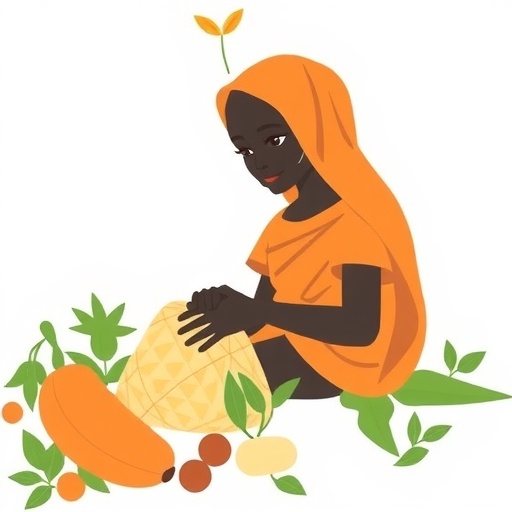As the world grapples with the intricate issues surrounding food insecurity, a recent paper by Swangsilp, Pechdin, and Sinsamphanh sheds light on the multifaceted relationship between socio-economic factors, gender interactions, and food insecurity experiences. Set to be published in “Discov Sustain,” the study promises to unravel the layers of complexity surround these pressing global challenges. The authors meticulously explore how economic disparities and gender dynamics contribute to the ever-growing crisis of food insecurity, which remains a major concern across both developing and developed nations.
Food insecurity can be defined as the lack of consistent access to enough food for an active, healthy life. This is a vital issue as it not only affects individual health but can have broader implications for societal stability and economic growth. The authors’ research contributes to understanding how socio-economic factors such as income levels, employment status, and educational attainment interact with gender-based norms and expectations, influencing individuals’ experiences with food insecurity. This new perspective adds depth to our ongoing discussions about food security and perhaps suggests new avenues for intervention.
In recent years, the world has seen a surge in food insecurity, exacerbated by various factors including climate change, political instability, and economic recessions. However, this study emphasizes that these broader issues are intricately tied to personal experiences shaped by one’s socio-economic background and gender. For instance, individuals from lower-income households often experience higher rates of food insecurity, not only because of financial constraints but also due to limited access to resources like knowledge, transportation, and social networks that facilitate food acquisition.
What is particularly striking about this study is the emphasis on diverse gender interactions. The authors argue that gender roles play a crucial part in defining how individuals approach food security. For example, in many cultures, women are primarily tasked with food preparation and management within the household, and their experiences with food insecurity can differ vastly from those of men. This complex interplay makes it essential to consider both gender and socio-economic status in policies aimed at combating food insecurity.
By examining qualitative data, the authors delve into personal narratives and case studies that exemplify these dynamics. They present evidence that shows women often face greater challenges when it comes to securing food for their families due to social expectations and responsibilities, which can lead to a cyclical pattern of food insecurity. The implications of this are profound, suggesting that efforts to alleviate food insecurity must be gender-sensitive and account for the distinct challenges that women face in accessing food.
In addition to exploring these personal stories, the study uses quantitative data to bolster its claims. By employing statistical analyses, the authors can highlight correlations between socio-economic variables and food insecurity rates across different demographics. The research draws attention to the need for intersectional approaches in understanding food security, highlighting that a one-size-fits-all solution is unlikely to be effective.
Another pivotal aspect of their research is the exploration of policy implications. The authors argue that governments and organizations targeting food insecurity must take into account the diverse experiences shaped by gender interactions. By adopting gender-sensitive policies, authorities can better address the underlying issues faced by vulnerable populations, paving the way for more effective interventions. Programs that specifically support women’s empowerment in the food system can lead to significant improvements in access and sustainability, ultimately creating a more equitable food landscape.
The study also acknowledges the role of technology and innovation in combating food insecurity. As the world becomes increasingly digital, the potential to leverage technology to improve access to food and resources is immense. However, the authors caution against assuming that technology alone can solve these entrenched problems; it must be implemented with an understanding of the socio-economic and gendered contexts that shape food experiences.
Through their comprehensive analysis, Swangsilp, Pechdin, and Sinsamphanh have paved the way for further research into these critical areas of inquiry. Their findings indicate the necessity for interdisciplinary approaches that engage sociologists, economists, and nutrition experts in crafting holistic solutions. Such collaboration is essential for understanding the complexity of food systems and for fostering resilience among populations most at risk of food insecurity.
In conclusion, the complexities surrounding food insecurity cannot be overstated. The research by Swangsilp, Pechdin, and Sinsamphanh emphasizes that socio-economic factors and gender interactions dynamically influence individual experiences of food security, which in turn impacts community health and stability. As we move forward into a future where food scarcity and insecurity are likely to become even more pressing challenges, this research offers critical insights and signals to policymakers the importance of considering these dynamics in their strategies.
To confront food insecurity effectively, it is imperative to foster discussions that spotlight these critical intersections of gender and socio-economic factors. By fostering a dialogue informed by empirical research, society can better advocate for vulnerable populations, paving the way for more resilient food systems for all.
Subject of Research: The complex association of socio-economic factors, diverse gender interactions, and food insecurity experiences.
Article Title: Complex association of socio-economic factors, diverse gender interactions, and food insecurity experiences.
Article References:
Swangsilp, S., Pechdin, W. & Sinsamphanh, O. Complex association of socio-economic factors, diverse gender interactions, and food insecurity experiences.
Discov Sustain 6, 995 (2025). https://doi.org/10.1007/s43621-025-01936-w
Image Credits: AI Generated
DOI: 10.1007/s43621-025-01936-w
Keywords: Socio-economic factors, food insecurity, gender interactions, resilience, policy implications.




